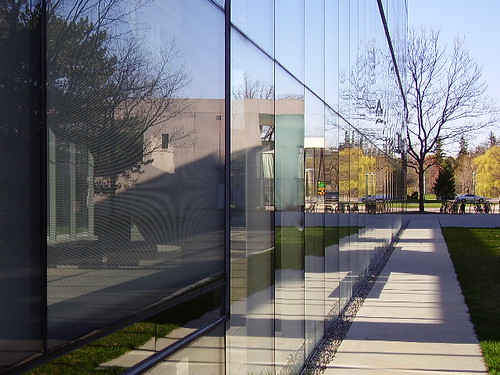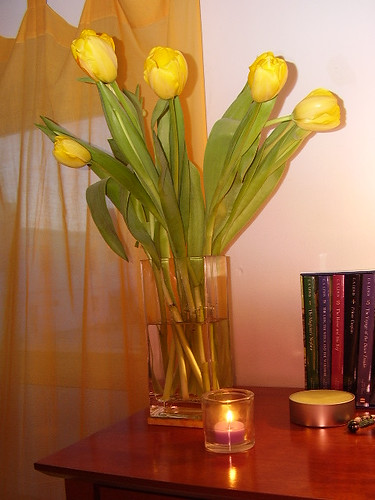More Photos






There’s a bit of a recurring theme to the presentations so far that hovers around teacher training in particular, and training in general. It started with the Keynote (which I blogged about yesterday), its head was raised again in this morning’s keynote (about the “Net Generation”) and crops up here and there in various presentations. It seems there’s a devout belief from on high that training is simply not necessary, particularly not for anyone under the age of 23.
I’ve fought this beast a million times. First: there have been legitimate studies that indicate that access to a computer doesn’t make students any smarter, or get them better grades. I think I’ve already blogged a few of those studies. A computer alone doesn’t solve anything, and even if a student knows how to play WoW (World of Warcraft), it doesn’t mean she is a technogenius. In my experience, undergraduates are not only not “digital natives” in the way that people over 30 like to think of them; they have cell phones, they have IM, but they have no idea how to find information on the internet, are floored by a new web application, aren’t comfortable playing around with something like a wiki to see how it works, and no idea why it’s not a good idea to send email from their h0tchk1987@yahoo.com account to the registrar’s office or two a potential employer. Technology literacy cannot be judged by a person’s gadgets; I often think these ideas are generated by people who are in awe of the toys available and find them difficult to use. Seeing that their 12 year old daughters aren’t intimidated by these gadgets, they decide that kids just Get It. It’s just natural for them, somehow.
I really wish the people who write these things would stop using their (genius!) 12 year old daughters as models and would instead ask the people who actually work with students on a regular basis. I did. I asked at UTM’s Computing Services what they thought about this idea of younger age == tech virtuosity. Their experience: just because a person is 19 years old doesn’t mean he knows how to set up his wireless, or knows how to do a windows update, or can work out how to configure his email account. Technology is a wide world of its own, and you can be extremely proficient at one part of it and be hopeless with another.
The result of this deep-seated belief that Kids are born with a USB plug in their mouths had a serious impact; my friend Minna Saulio from Finland reported in her research from South Africa that private corps provide money for computers, but no tech support; they have rooms full of computers they can’t use.
In sum: training is important!



One of the pieces of the puzzle I wanted to sort out coming to this MLearn conference was the issues of tech toys; are we trying to integrate Treos and Blackberrys an ipods because they’re cool, or because there’s actually some pedagogical value to using them? I’m personally of the opinion that there are lots of cool things in the world, and lots of things that students enjoy, but it doesn’t necessarily follow that all cool things can or should be used for our purposes. There are some things I think maybe we should leave alone.
But if there’s a good reason to use something, I’m all ears. I’m here to be convinced. And I’m not even a hard sell, I just want to see the extra pedagogical value that we can’t get any other way. I want to see that extra piece that takes a technology beyond “that’s cool”.
One of the tech toys I was expecting to see here, and expecting to not be impressed about, is cell phones. Like many other educational “toys”, it often seems to me that we adopt these other media when the standard one is still the best. For instance, while it’s great that it’s possible to download a PDF file to your cell phone, it would be easier, faster, and cheaper to download it on a computer. Does anyone actually want to read a PDF on a cell phone?
But I did hear some interesting things about cell phones so far. First, there was talk about sending broadcast messages from instructors to students via text message. There are a few things that make this interesting; first, email is on the decline. Frankly I’m delighted to hear that, because email should be used for the thing it does best (exchanging lengthy messages in text over the internet that aren’t necessarily instantaneous) and not for everything (rapidfire email chat, file transfer, important alerts). There was one example, that came from student feedback, about helpful messages sent to students over the Easter holiday while they were working on reports; I like the idea of instructors being able to give last-minute help (“That book we talked about in class, the one that’s so critical to this assignment, went missing from the library, but there’s another source that’s just as good, there’s a copy of it available on the course website.”). Of course there’s a training piece there for instructors; text messages cost the student money, so they really need to not send many of these things, and make sure the messages they send are really awesomely important. But I don’t think it’s a horrible idea.
Immediately someone in the room said, come on, how are we going to get faculty to take care of get ANOTHER piece of this tech pie? They have a hard enough time just getting student emails, now you want them to get student phone numbers? I think there’s a simple answer to that, though. Faculty shouldn’t be information collectors. The LMS should handle that, the SIS (student Information System) could be (and should be) the repository for all student information. The LMS should draw that information out of SIS for use in classrooms. That way students could just toggle the SMS option on or off, and faculty could just make use of it if they want to or not.
Second, they showed us a project they were working on in the UK where students could send pictures from their phones to a sort of discussion board. On its own, this idea isn’t that exciting, but in a course that has assignments based on things that require images, I think it’s great to have students go out on field trips and share a record of what they see with the class. Of course, you don’t need a cell phone to do this. You could use a camera and just upload the photo. But I do like the idea. I spoke with a woman from Athabasca University over lunch about using GPS software in a cell phone to trigger a series of sound/audio files on a handheld, so that students could walk around a site, and, based on their precise location, hear details about it. We talked about the idea of having a variety of students do projects about a specific site, from the perspective of different disicplines. So you could get a perspective of the place as a site of religious ritual, or from an architectural perspective, a religious perspective, an anthropological or sociological perspective, and so forth. Environmental, even biological projects. And what an amazing final product it would be! Students could create content for an interpretive centre that could offer up a multi-disciplinary tour of a site, complete with audio recordings, images, and text. Very cool.
In another session, one about the Mobile Library (how could I help but attend?) the idea of making your library’s catalogue browseable via Treo or Blackberry arose. On one hand, I sat there aghast. Browsing with a cell phone in Canada is just way too expensive for students. It’s way too expensive for me and I have a full time job. I know it’s cheaper in other countries, but I just can’t see it as being feasible here. But on the other hand…the idea of a mobile device in the stacks intrigues me. It would be great to be up in the stacks, hanging out among the books, and be able to punch in a title and get a call number without having to go back downstairs to a computer. It would be additionally awesome to hook it up with GPS and have it map the route out for you; how to get from where you are now to the book you want. Can we provide that? Can we provide handheld devices so that students can wander the stacks and find what they’re looking for? I can’t imagine how you’d do that. But it’s a neat idea.
So my personal jury is still sort of out on the use of the gadgets. But I’m starting to see some interesting applications for some creative assignments.
I’m blogging from the MLearn conference in Banff, Alberta. Things are moving very fast, so I’m grabbing what time I can to process the sessions and blog about them.
The keynote this morning was by Mary Lou Jepson of the One Laptop Per Child Initiative, nurtured, of course, by the MIT Media Lab. I’ve heard about this project, but I hadn’t really sat down and considered what it truly meant. Mary Lou framed it in terms of a social welfare and social activism more than anything else; education reform is no minor issue worldwide. She noted that, in a country where they experimented with paying parents to send their kids to school rather than the other way around, the kids themselves grew several inches taller than their peers. (This isn’t a crazy notion; height isn’t only about diet, as it turns out. Cuture, social safety nets and education have an impact on us physically as well as mentally.) So this isn’t just about spreading toys around the world, they see a real impact in the countries where they’re starting to rollout these laptops.
The thrust of this project is to provide laptops to every child in the world, and by extension to create a wireless network (using the laptops themselves as connections for those farther way from the access points) to bring resources into parts of the world where there are none. The technical details and design are amazing, and it’s clear that they’ve proceeded with great thoughtfulness and care.
The budget for this project is, essentially, a country’s textbook budget. So, what these laptops are doing is replacing textbooks in classrooms. When I realized this, my stomach kind of dropped. Is this a good thing? I mean, on one hand, if you had to choose between access to the internet and an ancient textbook that’s been kicking around an elementary school classroom for the last 15 years, which would you pick? I can understand that the internet is going to provide more than a single book (that few governments around the world can afford to replace yearly as knowledge changes and develops), but it’s starkness (“it’s the internet or a book”) that threw me. It’s a dramatic statement. But one that reminds me of what we can do to change the world from the comfort of our own classrooms.
It reminds me all the more how important it is for us (students, faculty, librarians) in the west to make sure those public resources (like wikipedia, like public learning object repositories) are as good as they can be. It reminds me that our own work, our own passions and interests, can translate into real life improvement in the lives of millions around the world. These laptops are going to be different than ours; on one hand, they can do some things ours can’t (work without outlets, without lithium exploding, with a level of brightness that allows them to be used in sunlight), we’ll need to think again about the way we design information for the public. We’re back to 1995 in terms of thinking about easy loading, keeping the images smaller and less frequent, thinking about content over flash. Sure, we can create quicktime movies as learning objects, but if we want to create something for the students in Brazil or Botswana, we’ll need to remember that download speeds aren’t the same there as they are here. I find this challenge exciting and inspiring.
The $100 laptop is designed to be not just an internet portal, but also as an e-book reader. Again you see the original intent; to replace textbooks. Another thing we can do from the richer end of the world is produce e-books for those computers. The term “learning object” seems too empty to me; what if your learning object, produced by students, produced by an entire class perhaps, is an e-book to offer to a country where books are scarce? I’m in a session right now about a class in South Africa that built their own textbook on a wiki. So, even before the laptop project gets started, we’re already doing that kind of work. I like the idea that academic work has a social conscience and a social responsibility. As someone who spent the majority of her adult life in graduate school, I understand the joy or pure academic study, but the part that made me leave graduate school was the lack of impact, the inability to leave the ivory tower from time to time and make that knowledge and depth of understanding useful to someone else. This seems like a bright little light to me.
What’s missing from the laptop program so far is the librarian’s perspective. What they’re creating is essentially a library interface, and in place of working with librarians, they’re working with archive.org. That’s what’s available, right? I think there’s an important role for librarians in this project to make their public resources available and ready for these students, in a format they will be able to make use of.
One of the questions from the audience was about training; who’s going to train the teachers? Who’s going to train the students to use these computers? The answer to this question: Well, kids are good at this stuff. They can pick it up on their own. And then the kids will teach the teachers. My immediate reaction to this was a raised eyebrow. Kids will just pick it up? With no support at all? How will that help the project? If the goal is educational, it seems that providing exactly no support is asking for failure. While I understand their desire not to foist learning theories and curriculum on other cultures, a helping hand would hardly be a bad thing. Some ideas, some pointers, some support. I wondered, as we talked about it, if it might not be the role of both teachers and librarians to provide some training to teachers and librarians in other countries to help them make use of the laptops and the tools. It’s much easier to subvert and be creative with technology if you know first how it works and what it can do. And while the goal of the project is to be technology only, not curriculum or theory, by giving the laptops to the children with the expectation that they will pick it up and teach the teachers, they are bringing that constructivist chaos and reversal of power (the student becomes the teacher) that we so value, but so many feel profoundly uncomfortable with. Are we setting up third world teachers to feel stupid? Are we setting them up to be subverted by their students? It just seems more value-laden than they intend.
But, all in all, I was impressed. Since I’ve been looking for ways to bring courseware out of the classroom and into the real world, this project just adds fuel to my fire.

I didn’t anticipate that buying real estate would be so stressful. I guess it makes sense that something involving putting yourself into this much debt would be, but it’s isn’t even so much that. Everyone warned me that after all the paperwork was signed I would feel pangs of regret and that was normal, but that wasn’t so much the problem either.
Mostly it was just all the little steps involved that I didn’t entirely anticipate, but probably should have. I’ve never bought anything serious before (computers obviously don’t count as “serious”). I didn’t realize how many people needed to know this much about me.
The first part that surprised me (but probably shouldn’t have) was that the mortgage company wanted to know every detail about my financial history. I don’t mean running a credit check or knowing how much money I intend to put down, or even requesting pay stubs or anything like that. I didn’t realize they would want to have record of every transaction I made on all of my accounts for the last three months. My mortgage company now knows the depths of my relationship with Shopper’s Drug Mart. My parents donated a sum of money to my house-buying endeavours, which appeared in my saving accounts as a bank-to-bank transfer. Everyone wants to know where that money came from; everyone. I had to get my father to sign a waiver that indicated I would never have to pay it back. The teller at the bank wanted to know how I got it; she said that “funny things” happen these days and they have to ask questions when a largeish sum of money appears and someone tries to take it out the next day. It wasn’t the next day. It was a month later, and I have been a loyal customer of this particular financial institution for the last 30 years. My mother is a former employee of this particular financial institution. No one trusts anyone when it comes to money.
Before all that was just finding out if I qualified. I’d actually done the calling around a couple of months earlier, so I knew that I did, but it was still stressful, sitting on the phone, listening as they punched in the numbers. “Let’s just see how the ratios look.” Pause. Pause. Pause. I know the ratios look okay. But suddenly it’s like being back in junior high and waiting to see if the cool kid is going to pick you for their soccer baseball team. Come on, is it a yes? Is it? I know it’s got to be a yes, I’m a good kicker! Come on! Pick me! “Oh, the ratios are fine, sure, you qualify.” Great! Now suddenly I feel sort of dirty.
Do you know how many times I’ve had to declare that I’m single? I figured it would be remarked upon, a single woman buying real estate. So I can’t say I was entirely surprised about it, but, man. Did I ever have to clarify it a lot. And the house inspector told me that maybe my townhouse would be “lucky” and now I would “find a man”. Sadly there’s no keyboard smiley that entirely captures my reaction to that statement.
My brother-in-law is telling everyone that I’m a grown up now, which I mostly agree with, except when I’m calling all the experts; there’s always a surly woman on the other end of the phone who has zero patience for the fact that I don’t know what I’m doing and expects me to know all the lingo.
There’s a whole language to buying real estate that makes no sense until you’ve had to participate in it. You need a status certificate as part of the process of buying a condo. You need to decide between a variable and a fixed-rate mortgage; is it portable? Is it assumable? (Why do I suddenly feel undereducated?) You discover the land transfer tax what What It Means to You. You work out what “title” means, why you have to have it insured, and why a “title search” is not nessarily just something you do in a library catalogue (and that it isn’t nearly as cheap). You find out that a “lien” isn’t just a posture you assume when feeling jaunty. Dual agency: boon or bust? I Aluminum, or copper wire?
But in the end, it appears that I did all the right things, and closing is just around the corner. Here’s to luck.

The view from the Go train at Kipling.
This view always appalled/intrigued me. It’s a mass of power lines, so unashamedly industrial, just there alongside the train. At Dixie it’s just piles of tractor trailor cargo units, piled on top of each other. I should have taken a picture of those too, but I guess I figured all those strange looks I got for taking this picture was probably enough for one day. I took this with my cell phone, which gives it that sort of otherworldly watercolour sort of look.
From the Times Online: The next step in brain evolution. Let me summarize: young people, who have lived with the internet all their lives, are digital natives. If you’re over 30 and didn’t grow up with text messaging, MSN, and Google, you’re a digital immigrant.
This particular bit of rhetoric really gets to me, and I’ll tell you why. It’s a broad-swath excuse, apparently designed to make those over 30 feel safer about their own current knowledge base. As long as new communication technologies are something your brain is or is not hardwired to comprehend based on your experiences while a preteen/teenager, the rest of us, who don’t understand this new-fangled email thing (or whatever it is people don’t want to understand) can relax and not feel behind the times or missing out. We’re just different, that’s all. This line of reasoning has the added effect of underscoring that which we feel is already true; each generation is a radically new product, and history is based on a set of processes built upon the last that lead to greater and greater progress. Standing on the shoulders of giants, and all that. We can happily let the kids do their internet stuff, knowing that our own smug little land of postal service and telephones is the giant they’re standing on.
Because we all stop learning at age 20, right? And there should be no more pressure to learn after that. Is that really the world we want to live in? That’s like asking us to stop reading after age 20. All the greatest books have already been written by then anyway, right?
I object strenuously to the suggestion that those 20 and under are somehow more “digitally native” than those of us who came to the internet/computers later in life. The difference is not in this early experience; the difference is in whether or not you’re prepared to let something new change your life. It’s about a willingness to learn and an openness to new ideas. The only relationship between that willingness and age is that we expect people under 20 to be open to learning That’s not a “new generation” or strange new brain chemistry. That’s a decision we’re making about how we want to live our lives, and where (and when) we opt to limit ourselves.
From the article:
Emily Feld is a native of a new planet. While the 20-year-old university student may appear to live in London, she actually spends much of her time in another galaxy — out there, in the digital universe of websites, e-mails, text messages and mobile phone calls. The behaviour of Feld and her generation, say experts, is being shaped by digital technology as never before, taking her boldly where no generation has gone before. It may even be the next step in evolution, transforming brains and the way we think.
As long as it’s chemical, it means we don’t need to feel threatened by this personally. It’s not a choice, doesn’t this sound familiar? It’s biology. Further:
“First thing every morning I wake up, check my mobile for messages, have a cup of tea and then check my e-mails,†says Feld. “I may have a look at Facebook.com, a website connecting university students, to see if someone has written anything on my ‘wall’. I’m connected to about 80 people on that. It’s really addictive. I’ll then browse around the internet, and if a news article on Yahoo catches my eye, I’ll read it. And I may upload my iTunes page to see if any of my subscribed podcasts have come in.
“upload” is most defnitely the wrong word to use here. I presume she’s thinking “load” the podcast category inside itunes, or perhaps “download” the latest podcasts through itunes (which doesn’t use the term “download” at all, but rather the more logical “get”), and perhaps she wants to sync her ipod so that the newly downloaded podcasts are transferred to her ipod. But she’s not “uploading” anything.
Sure, Emily listens to podcasts, but is she a digital native? Does she speak the language, know how stuff works, can she easily move between one digital landscape and another? With that language, I’m going to have to say no. Using something doesn’t mean you understand how it works, and it doesn’t mean you can take that use to the next level and apply the knowledge gained from the use to another circumstance.
That’s what makes Emily a “digital nativeâ€, one who has never known a world without instant communication. Her mother, Christine, on the other hand, is a “digital immigrantâ€, still coming to terms with a culture ruled by the ring of a mobile and the zip of e-mails.
Okay, so that’s Emily, age 20. Enter Rochelle, age 31 (32 in a couple of weeks, might I add). Unlike Emily, I didn’t touch my first computer until I was 17. I stumbled on the internet when I was 20 and figured it was a toy. I’d say, according to this article, I would be a “digital immigrant”, a person who grew up without the internet, without cell phones, without text messaging and emails and IM.
First thing in the morning when I wake up, I open up my computer, which is constantly connected to the internet because I bought myself a wireless router. I check my personal email, which collects any new comments on my blog, and then I let my widgets check my gmail, which collects comments from my various other journals (at livejournal, Vox, etc. I check my livejournal friends page, leave a few comments, engage in a few conversations about this and that. I see new pictures posted by an American friend of mine who is currently on a cruise to Alaska, I see what’s new with my friend in the Peace Corps in Jamaica. I check my RSS reader to read my friends’ blogs. I check to see if my friend with the very hot new job in San Francisco has broken any new bones lately. I take the pulse of the blogs by those around the world who share my profession. I say hello via IM to my friend in Australia, who is just settling down for the night. We complain about the weather (always the direct opposite from each other). I wave hello to my friends in the UK. I have my breakfast with my buddy Jason, who is sitting down to his own breakfast in his condo in downtown Toronto with his lovely wife. We trade links we think are interesting and complain about the ones we think are wrong-headed.
Our conversation this morning:
Rochelle: http://www.timesonline.co.uk/article/0,,2101-2256968,00.html
Jason: hypsterism
Rochelle: yeah, I think so too
Rochelle: am writing an annoyed post about it
Rochelle: we should write a joint post or something
Rochelle: because
Rochelle: how old are you now?
Jason: 44
Jason: and I started using computers at 27
Rochelle: yeah, they’re suggesting that only 20 year olds are “digital natives”
Rochelle: and I dare any of these kids to be more digital native than you and I
Rochelle: I’m posting about that
Jason: 20 yr olds are digital naives, not natives
Rochelle: EXACTLY
Jason: The digital naives have lost all sense of critical distance
Jason: and are peons to the marketed moment
Rochelle: I think this kind of thinking is an excuse
Rochelle: for people over 30 to not bother with this stuff
Rochelle: because it’s a generational thing
Jason: unable to function outside the user manual
Jason: and the marketing campaign
Rochelle: letting adults off the hook
On the way to work, I may text my friends for the entertainment value. If I’m on the train on the way into Toronto, I definitely text for the entertainment value. Since I don’t want to spend the money to browse the internet from my cell, I text a friend near a computer to google something for me if I need to know something. (For instance: this past weekend I texted Jason to ask him to find out why the trains weren’t moving out of Union station in Toronto; the bus driver wasn’t sure, but I told him it was a freight train derailment, since that’s what Jason found out through Google News.) I was on Toronto island during the final world cup game; I texted a friend in Syracuse to ask her who won (since I know she’s a fan). I got an answer in about a minute and a half.
Being a “digital native” is not about your early experiences. It’s not about an aptitude or a particular brain chemistry. It’s about being willing to explore, to be changed by technology, and a desire to be connected in this way, beyond the physical space we inhabit. It’s a choice; no one has to do it. But we’re not limited because we’re not 20.
I’ve been a bit distracted lately. Let me tell you the story.
I’ve been spending a lot of time with the Multiple Listing Service, looking at places available for living in. Why I’ve been doing that is really an open question. I guess mostly just interest. What’s around? How much does it cost? What can I reasonably afford in this, one of the most expensive cities in the country?
And, it’s fun to see how people decorate. Or, shall we say, how people are prepared to live. It’s easy to criticize some one else’s design choices from the other side, of course, particularly when you (like me) watch way too much HGTV. It’s also given me a lot to think about; what exactly am I looking for? How much space do I really need? How much am I prepared to pay for? What’s more important, a great layout, a great price, or a great location?
About a month ago I discovered that there’s a condo building just down the street from me with units up for sale. I was delighted; I already know how to live in this location! A shift of a street to the right wouldn’t be difficult at all! It would be perfectly dreamy! But when I went to look at the place (with my parents in tow), I discovered that it didn’t fit into my vision of my own future. In spite of/because of it’s feasible price, it was just too small. (In fact, it looked like a Comfort Inn room.) I fell into despair.
Seeing a place I could afford and was in the right location that in my gut I absolutely loathed made me think. A lot. What wasn’t there? What was it I was looking for? The conclusion I came to wasn’t the obvious (granite counters, three bedrooms, two bathrooms, etc.). What I wanted was a nook. I wanted a space I could carve into a writing nook. Because that’s what I do in my free time. I wanted to make space for my free time. And that’s what was missing from the Comfort Inn room I looked at. I could fit a living room and a dining area into it. The bedroom was pretty big. Nice balcony. But where do I put my nook?
After a day of hand-stapled-to-forehead, I went back to MLS and started all over again. And that’s when everything changed.
What do you do when you intend to buy something (at some point in the next, oh, year or two), and you see something that you think would be perfect for you, interest rates are going up, and the price is so low it makes you cock your head in surprise? You call the agent, that’s all you can do.
So within a week or so it was all settled; I bought a townhouse.
Two bedrooms, two bathrooms (one an en suite off the master bedroom), two storeys. A laundry room. Ground level, so also a sliding door from the dining area that leads to a patio. At the moment it’s pretty overgrown, but by the time I’m done with it it will be an outdoor dining area, a seating area, and a garden. It’s an end unit, so neighbours only on one side. It’s on a private, quiet courtyard facing away from any streets. A view of greenery from all windows. central A/C and heat, water, and electricity included in the condo fee. And the piece de resistance: a “den”. It’s listed as a den, but it’s really not. It’s actually a 9 by 8 foot space at the top of the stairs, with a window. I laughed a little when I saw it, since that hardly qualifies as a den, but it’s the perfect nook.
What else can I do?
Closing date is August 1.
I’m really struggling with the idea of inquiry-based learning practices. Every discussion about it ends up upside down and backwards, because we all seem to mean something radically different when we use the terminology. The general idea appears to revolve around having students be more engaged in the curriculum, and beyond that I can’t work out any common ground.
What’s becoming a standard definition of an inquiry-based classroom (from the experiences I’ve had with it thus far) is one where the instructor does not lecture and does not impose topics, but instead stops, turns the lights around, and asks students what they want to learn.
This sounds great. It really does. But it concerns me. It concerns me because I’m not certain students (particularly undergraduate students, but also graduate students, to be honest) are ready to answer that question. And I think it’s okay that they’re not ready. It’s like bringing someone into a darkened room and ask them which of the paintings on the walls they would like to learn about. They need to get a glimpse of the place first in order to tell you, and I think our job is to turn up the lights in the room.
On a basic level, universities are already structured in this way; once we get through, for instance, History 101, students get to tell us what areas they want to focus on: African American history, Renaissance history, the history of poverty in Europe. We give them a bit of an introduction before we ask them to make choices, and I think that’s wise. They don’t know what we know. The come to us to learn. They come to us to have their universes turned around, to discover that the thing they never took any interest in before is actually utterly fascinating. I never liked history, (in fact, I failed my history classes in high school. Twice.) but I found it completely fascinating as an undergrad. I had no particular interest in religion until I started taking history classes either, and I now have a master’s degree in Theological Studies. If I hadn’t been guided by faculty who shaped the courses they taught with their own research interests, I wouldn’t have discovered these two passions in my life. I know I’m not the only one who can say that. What if they had just asked me what I wanted to learn about? I can’t imagine what I would have said, frankly.
Inquiry-based learning methods (as described to me thus far) appear to undervalue the resource that the instructor really is to the student. While I’ve spent lots of time talking about changing the structure of power in classrooms (taking some power away from the instructor in order to empower students), but if the structure of the course is based entirely on the questions of the students, there isn’t much room for the knowledge of the instructor. Someone in one of the sessions today asked about this; how can you bring research and teaching closer together if the students are determining the direction? That resonates with what Bob Rae (“call me Bob” Rae) said in the keynote; research and teaching need to go hand in hand. Without the research, the teaching is empty; without the teaching, we’re no longer a university.
In an ideal world, the reason students come to universities, the reason they exist in the first place, is because students want to learn from the experiences of established scholars and grow intellectually with their guidance and feedback. As a graduate student, I wanted the instructor to set the parameters of the course. I get to pick what I want to study based on the course description, after all; I didn’t come to school (and in one notable instance, I didn’t [have someone who was not me] pay my 13K USD in tuition) to learn about what the person sitting next to me wants to study that day. I came to learn from this professor, I came to glean some knowledge from and be guided by this particular instructor. She knows things other people do not. She has read documents other people have ignored. She has had epiphanies and realizations that I can learn from. I wanted her to establish the direction we were going to take, and give me freedom within it to understand it in my own way. I would love to see instructors tie their teaching in very closely with their research; to me that would be the ideal learning experience.
I’ve been involved in amazing inquiry-based learning experiences. One in particular was at an advanced graduate level (a phd class) where the instructor plucked a particularly thorny question out of her own research process and we worked on it as a group. It was completely fascinating, and I hadn’t had such an amazing learning experience prior and I have yet to experience anything that matched it. But she didn’t ask us what we wanted to learn; she gave us a question and gave us the option to participate in that inquiry. I felt like I had been let into the tiny little room at the top of the ivory tower, really engaging in the deep questions, and participating in finding out the answer. Until recently I thought this was inquiry-based learning. But apparently it’s not; it’s merely a subset called problem-based learning.
Don’t get me wrong, I see a place for peer interaction in a classroom; in fact, I spend quite a bit of my regular workday pitching that very idea. But (perhaps biased as a former phd student in a very traditional and structured discipline) I’m uncomfortable with unloading the intellectual work of creating curriculum onto students. Of all the things the extremely well-educated among us can offer society, presenting a unique and surprising path through a dense discipline seems like the very best. There’s lots of freedom within a structured curriculum; it’s still up to the students whether or not they want to be there, and what perspective they want to take on the ideas that arise.
Can someone explain inquiry-based learning to me? Please tell me I’ve misunderstood.
From STLHE:
I’m gratified to see an emphasis on “deep learning” or reflective learning from faculty members; mostly because I have a tendency to work from my gut rather than theory (I’m working on that), and my gut reacts well to the idea that students need to reflect on what they’re learning. It’s nice to see that other people, who work from something more citeable than their guts, are thinking along the same lines.
I’ve never been that jazzed about the idea of an “e-portfolio”, because it seems a little basic. But I’m getting the idea now; it’s not all that different from where we’re trying to go with institutional blogging. We want blogs that stick around throughout a student’s academic life; not something that’s tied to the course, but to the student. This way, a student can go back over their own process, and as you get farther along, you could conceivably reflect on your entire academic career, tracing the growth of an idea or a concept over multiple classes and multiple years. So I guess I need to stop thinking about e-portfolios as a set item or piece of technology and more as a concept. Obviously I’m already behind the concept.
From a personal perspective, I finally went through and revisited my own archives, and found a post I wrote in 2001 about blogging in higher ed. I read this segment of the post during the presentation yesterday, because I’m surprised that I still agree with my younger self so much:
I’m getting more and more firmly convinced that blogs are tantamount to essential in humanities classes. I believe this to be true because a) it allows students to speak in a ‘public’ forum about their readings and the lectures in a course, no matter what format the class takes, no matter how shy the student is, and no matter how many students are in the class, b) it allows the instructor/TA to read, respond to, and evaluate students critical thinking skills, understanding of the course material, and if they’re paying attention at all, c) it allows students to read and respond to each other’s opinions in a ‘democratic’ space, d) unlike reflection papers or other forms of journaling for class, the responses are not static documents that are handed from student to evaluator, but exist as individual archives of thoughts and information that are permanently available to both the student and the teacher. Blogs as Educational Tools? April 5, 2001.
La plus ca change!
In the session I’m in right now, we’re talking about reflection in learning, and the conversation is really interesting. So much interest on the process! Someone just suggested that if you want to use reflection in class, don’t use the word “reflection”. The questions she suggested asking instead are What? So What? Now what? I like this; there’s a delgate here who’s an undergraduate student from Calgary who tells us that she’s been writing reflection papers for years and only just got it this last term. Students have an idea of what “reflection” means, and they can tell you that they’re doing it while not doing what we’re looking for. This reminds me of so many of the problems we hit in librarianship; the terms get in the way of getting the job done.
This conference is very good; of course, when most of the delegates are faculty, you end up with a roomful of very critical listeners who ask very pertinent and challenging questions.
Something to roll your eyes at: Republicans in the US Congress want libraries to block web 2.0 in order to get funding.
The Deleting Online Predators Act (DOPA) would require schools and libraries to block access to a broad selection of web content, including “commercial Web sites that let users create web pages or profiles or offer communication with other users via forums, chat rooms, e-mail or instant messaging.” Not only would the bill block sites like MySpace—where even libraries have set up their own profiles—it would also block instant messaging, online e-mail, wikis, and blogs.
Something to play with: a web 2.0 app that lets you add a group chat function to any website (even one that’s not yours!) I couldn’t get this to work properly in Safari, but it works nicely in Camino. I hear it works in firefox too! (Cheers to gabbly!)
And thus ends another joyous workweek.
Today I gave a presentation with Derek Williams, a History professor at UTM, at TechKnowFile, the U of T IT staff conference. Right before this started we discovered that they had booked us into a room with a class in it, so we had a last minute scramble to a new room. And then somehow between leaving home this morning and unpacking to give the presentation at 3pm I lost my video out cable, which really bums me out. I loved that cable, man. But amazingly they found me one to use for the presentation.
Anyway, all this is to say, when we started this presentation I was a little off my game, but we picked it up again pretty fast. In the end it was a lot of fun and there were lots of interesting questions afterward. Derek Williams is an amazing guy and a great instructor, and we used this tech_know_file presentation as a moment to talk about what he did with his Latin American history class this winter term. In sum: he gave his students something beyond a grade to work for. He asked his students to improve the content of Wikipedia.
You can download and listen to the presentation here: Wikis on the Move: TechKnowFile.06 [19 meg file].
Edited to add: I found my video out cable. I was on my bedroom floor. Phew.
An idea came up at the UTL staff conference on Monday that has stuck with me; it was from Stephen Abram‘s keynote, and it reverberated throughout the day (and the week): radical trust. Stephen was evoking amazon.com and suggesting (as many people do), that we need to radically trust our users and let them add to our catalogues, add to our resources. Talking about this in terms of radical trust changes the dynamic of the conversation; rather than talking about keeping the catalogue “objective”, we’re talking about how we perceive students, what we expect from them. And I think the issue of trust is a completely relevant one. We tend not to trust students.
And it’s not just us, not by a long shot. This is the real challenge of the so-called “web 2.0”. We can’t control everything. The whole point of interactive technologies is that you can’t control them. The only way we can use web 2.0 applications is by trusting our users. We can anticipate the worst, and even have some policies in place to deal with the worst case scenario, but we have to have a general belief that students have a capacity to engage with each other, to offer something to an academic community, and that they will actually do that if we give them the chance.
The other piece of radical trust is one that shoots straight to the heart of librarianship; we need to let users radically trust us. This is the more dangerous option. In order to serve students well, the best thing we can do is let the students tell us who they are. We need to remember them, tailor our resources to their needs and interests, build on what they’ve done before. This is what amazon.com does, this is what Google does. It profiles a user and delivers customized information back to them. It profiles a user. We hate this idea, I know we do. It’s tinged with commerciality, it screams violation of privacy. I don’t even know what I think of this one, frankly. We do need real portals. We do need to customize our resources; our information landscape is so turbulent and confusing, we need to offer some support. But do we want students to let us know these things about them? Do we want to keep records on them? We don’t want them to trust us that much. We don’t want the responsibility of that trust, because we can see how easy it would be for that trust to be betrayed. Should they trust us? Can we be trusted? Can we protect them once they do?
When people stand up to speak about the “information age” we’re living in, they seem to so often jump to the conclusion that the digital world is so radically different from what came before. Digital exceptionalism, of course, does no favours to us as librarians, us as users of information technology, or us as a culture.
I’m writing from the WILU conference at Acadia University in Wolfville, Nova Scotia. Last night the keynote speech included a video about the importance of information literacy. Within it, the narrator points out to us a “fact” we’re supposed to already know and accept as a given; a person in 1500 could get by with about the same information as someone in 1400. But now, oh this is longer true now, things change so fast! Someone in 1900 would not have survived in 2000!
The big difference with the print revolution, and the digital revolution, is not that there is more information. The possibility of concieving of more information in the universe is not linked to the technology at all. A sense of how much information there is is something that changed radically in the Renaissance, but that shift had more to do with teleological change than technological change. In a world where you believe that God created a set number of qualities, elements, creatures, and ideas, and that the great multitude existed in the garden of Eden and grows only fewer in the prelapsarian world, you cannot have information overload. It’s simply not culturally possible. The people a generation before you had access to more information than you did, and your children would have access to less than you have. The cultural shift that allowed for the creation of “new” knowledge, and for knowledge to be built, was a bigger shift than the digital one we complain about.
I’m frustrated that anyone would create an information literacy video that was so blatantly ignorant of European history and yet still invoking it. The medieval world was not any less of an information society, nor was it one with less information available. The difference is that today we keep our information in referencable resources (like books, like digital media) rather than in our heads. I’m immediately reminded of the story of Martin Guerre. In short: Martin Guerre grew up in a small French village in early modern France. He married a local girl, and then went off to war. He was gone for over a decade. Then one day he came back. He said all the right things, recognized everyone, reminisced, returned to his wife. But it turns out he was not Martin Guerre. He was Martin Guerre’s friend. He had merely gleaned an entire life’s worth of information from the real Martin Guerre, and managed it well enough to take over his life. If that’s not an information revolution right there in one person, I’m not sure who is. We talk about identity theft now on less dramatic scales. The pre-literate world did not have less information. It merely expected us to keep that informaiton in our heads, to convey it to each other in a clear and accurate way, and process and take in that information quickly and efficiently. The fact that we keep information in books or on the internet is just a relocalization of information. There’s more access to information, because we can get at the information created by or discovered by more people, but we’re also able to be more selective about what information we consult and absorb. The near-constant abuse of history in librarianship circles makes my historian self cringe.
I can’t help but think historically when people speak about ideas about privacy, information overload, surveillance. In the keynote this morning one of the speakers suggested that we’re entering a brave new world, because if she runs a red light, the system takes a picture of her. She’s now always being watched, even if no one is watching her. Of course, before mass urbanization completely took over, if you broke a law in public, you would certainly have been seen and recognized; this idea of privacy, of being completely anonymous in the world, is like a very modern notion. To talk about the tremendous newness of this surveilled society seems like another form of exceptionalism to me.
This morning I gave a short presentation at the UTL Staff Conference about collaborative software. I recorded myself with my ipod and have reduced the original 40 meg file into a 13 meg podcast.
Now, during this presentation I was demonstrating software, so maybe you had to be there to get it. But you can download the file here.
A rough outline of what I was talking about:
1. Our UTM blog. I can’t show you that interface because it’s behind a lock, but it’s a general blog platform (written by UTM computing services) with an upload facility and comments.
2. Our UTM Library wiki. It’s a standard mediawiki like Wikipedia.
3. Writely.
4. Writeboard.
5. The jewel in the collaborative software crown: Subethaedit. This is one you really have to see to believe, I think. But if you have a mac, check it out. (If you have a mac and you want to experiment with subethaedit, ping me on IM or drop me an email! I’m more than happy to demo it with you!)
The podcast is about 38 minutes long.








A little windmill in Streetsville.

CCIT Building, UTM campus.

A house in Streetsville. One I’ve been admiring.



I was barely listening to the radio just now; I was mostly just putting away my laundry and thinking about what an amazing week it’s been and what’s going to happen tomorrow when my brother-in-law and my nephew come to pick me up for the holiday. But there is a fellow talking on the radio, and my ears picked up when I heard this:
“One day the books will all be arranged based on mathematics,” he said. “Another day, it will be based on current events.”
Not knowing what this show was actually about, I immediately thought of a library, about Dewey and the Library of Congress. Can you imagine if we could rearrange our collections with the snap of a finger, and did so regularly based on particular themes? No more objective classification scheme; a different order every week. Imagine what sources would start rubbing shoulders if you could do something like that! What a unique perspective you would get every week! Imagine the serendipity; toss the disciplines up in the air and let the subjects define themselves in different ways, multiple ways. Human feeling encoded into the stacks; the multiplicity of opinions and possiblities all made flesh before our eyes, shifting and changing as they always must.
Turns out he was talking about a bookstore in Montreal with a great front window. Well, that’s okay. I got my piece of a dream out of it anyway.
The (possible) future of reader’s advisory: Story Code.
“What am I going to read today?”
A familiar question to most readers, because it is a struggle choosing what to read next.
Well, StoryCode is here to help.
StoryCode.com is a unique source of inspiring book recommendations and a great way to find the next book to read. And its power comes from the collaborative passion of readers.
It was only a matter of time ebfore someone used social networking software and complex tagging to do something like this. I’m sorry the library world didn’t do it first. (Check it out: there isn’t a single librarian among them.)
In keeping with my current fixation on metaphors, I present to you our current bugbear, and my pet peeve of the moment: wacky email addresses. I wouldn’t be surprised to learn that a lot of universities have this same problem; students arriving on our doorsteps already married to a goofy email address, and not feeling any particular need for another (official) one. I’m talking about cuddly_girl1988 and hotstufflolxxox and kiss_my_grits7953@hotmail.com. This is the email address all their friends and loved ones know; so it’s the one they keep on using as students.
It seems to me that email addresses feel akin to phone numbers to people; this is the place at which you can be contacted, it is a set of characters completely without meaning, and you should avoid changing it at all costs to avoid confusion or loss of contact. Sometimes I wonder if an email is also akin to a personal name; you only change it in the case of something truly life-changing, like a witness protection program, an adoption and (maybe) a marriage. No matter how stupid it is (see Peaches Geldof about that one), you don’t change your name on a whim. It’s yours. Having to change it would be a fundamental shift that would throw your whole world into chaos, and no matter how important a change it was, someone would always call you but your former moniker, just because they’re so used to it.
Institutionally, students’ unwillingnes to use their school email accounts is a problem because the probability of these addresses getting typed in wrong the first time is so high. One little typo in sparklyp00_g0dd455@hotmail.com results in a lot of errors when we need to send a student something important. It means a lot of password resets when they use these accounts with courseware. Every student’s institutional email address is generated by the system, and thus, it’s far more likely to be correct the first time. We have elaborate password schemes to (try to) ensure that the right person gets the right email. We care about privacy. We care about sensitive information staying controlled. Those are the official reasons for encouraging the use of institutional email.
What I don’t understand is why more students don’t jump at the chance to have an institutional email address. These folks worked hard to get into school; isn’t this email address a mark of that success? You have arrived; you are one of the elite pack. It’s like getting stamped with a particular kind of honour or authority; me @ this great and glorious insitution! ph34r my mad academic skillz! I’m a smrtypants! Yet, it seems like the majority of students don’t bother to ever activate their school email accounts. They stick with babygirl976xox@hotmai.com instead.
And thus, my latest metaphor: your institutional email is your interview suit. Your church outfit. Your best dress. The clothes you put on when you want to be taken seriously, make an impression, get a job. Institutional email gives you a degree of authority before you even open your mouth. Imagine a room where you need a certain amount of intelligence to get in; your institutional email address is like flashing your sterling transcript at someone, who then taps the bouncer on the shoulder and tells him to make way for you. it’s like saying,hey, I’m an adult, I got into a university, listen to what I have to say! I’m not just some joker. I belong. Not only that, but because this account can only be set up by an administrator, your addressee know for sure who you are; you’re the one with the name in the “from” line. Undebatable. (Though of course there are exceptions…but they are that. Exceptions.) Anyone can get a hotmail account; not everyone has an the right to an institutional email address. It’s a useful priviledge of membership.
Sure, you don’t want to wear your best clothes all the time. Your friends aren’t impressed by them; they know you and don’t care what you’re wearing. They just want to hear what you have to say. Your hotmail email is like your ripped jeans and your favourite t-shirt with the stubborn stain down the front that still doesn’t stop you from wearing it. But do you want to wear that outfit to a job interview? Do you want you thesis adviser or a graduate admissions committee to see you in it? Your b4llybutt0npi4rc4d@hotmail.com might be kicky in some circles, but it’s not really the way you want your instructor to think of you, is it?
I can understand people liking the idea of having just one email to check, but I highly recommend two email addresses for everyone. You should have one for your “professional” activities (that includes your student work and communication), and one for your personal life. Have you ever been in a situation where you need to grab a document from your email in order to do a presentation? Have you ever had to do it from a computer that’s projected onto a screen, in front of a roomful of students and your instructor? Do you really want all your personal email displayed to these people? Do you really want to log in as sweet_piece_of_a55@yahoo.com in a situation like that?
Having two email addresses also means you can shut off school or work. When I need a break, I don’t check my work email on the weekends. Because I have two accounts, I can still check my personal email, and keep in touch with friends and family, without having to get dragged back into work (or school). Doesn’t everyone need a break now and then? Let the school account collect the “work” for you, and keep your personal email for everything else. It’s like having an office, and an office phone; you don’t want it ringing in your face when you’re at home watching a movie.
On the flip side, I’d strongly caution everyone from using work email (or school email) to do anything personal. It doesn’t happen often, but there’s always a possibility that an administrator may at some point be given the authority to go through that email. It belongs to the school/office, after all; that’s in the fine print. Don’t say anything in work/school email that would make you blanch if you knew your boss/instructor/administrator might see it. This is why I think everyone should have two email accounts; we always need a secondary channel. We need to be able to be a little bit off the record sometimes, though committing something to “paper” (even digitally) comes with its risks.
So keep funkycupoflove@hotmail.com. Check it often! But don’t email your instructors from there. It doesn’t look good, and it just means you have to hear back about school stuff when you’re in fun mode. Activate that school account! That way, we all win!

Tulips
There are two things I promised myself when I had a decently-paying job; lots of vegetables regularly (good food is tough to get when you’re watching every penny!) and cut flowers. Not every day, but once in a while. Tulips are my favourites, and yellow is my favourite colour.
The meme of the moment: how to lose your “techie” librarians, started by Michael Stephens. I read through the posts by my esteemed colleagues Sherri, Dorothea (my evil twin!), Jessamyn, Karen, and Sarah, among others. Fascinating reading. These lists are a combination of a variety of things; good experiences turned inside out, bad experiences (personal and merely observed) laid bare, intreprations of the attitude of the profession as a whole, through the professional literature, certain high profile kerfuffles in librarianship (and their fallout), and the culminative impression we get from reading the daily stories from tech librarians around the world though the librarian blogosphere. I am reminded of how very lucky I am to work where I work, with the people I’m surrounded by. Reading through all those posts, and by writing my own list of what would turn me away, it’s clear that it’s all in the attitude. Have I mentioned lately how much I love my job?
10 Attitudes That Would Make this “techie” Librarian High-Tail it Out of Your Library:
10. The rule is, if you get your hands dirty, it’s not a professional task. In spite of the fact that writing code doesn’t actually get your hands dirty, it does in a virtual sense, so it’s best to consider those librarians less than entirely professional.
9. Remember that as long as you have a librarian nearby who works with computers in some form, you don’t need to actually learn how to do anything with them yourself. Surely this person has been hired simply to alleviate that pressure from you. Just ask them to do whatever petty tasks you have hovering around you. It’s sort of like having your own secretary, really.
8. You can’t trust people who know more about technology than you do. Second guess them at every turn. Don’t trust their estimations of timelines; they always take more time than they need. If something is effortless to use, it was probably effortless to build as well. Don’t let a tech librarian bully you. You may have no idea how that application works, but you still know best.
7. Things that are “fun” are not educationally valuable. Keep that in mind at all times. Students shouldn’t read email from their friends at a public terminal, and they sure as heck shouldn’t be using IM to communicate with anyone. No one of any worth communicates in short bits like that. Libraries are places for silence, deep thinking, and serious learning. That is all.
6. This should be your mantra: traditional librarians are the “high-concept” people. The thinkers, the movers, the real planners. Traditional librarianship is where the direction for the profession is going to come from. Technology librarians are more “low-concept”, more how-to and technical; they’re your support staff. They basically act out the big plans of the others. It’s sometimes politically incorrect to say this outloud, but don’t imagine that anyone thinks otherwise.
5. Blogs are stupid. “Blog people” are even stupider. What’s a wiki? Why should I care? It’s best to approach all new applications not only with skepticism, but with active distrust and scorn.
4. Tech librarians cannot take on leadership roles. It’s like this: every person has a finite amount of ability. If you have someone at your workplace who’s pretty good with computers, that ability naturally reduces their ability in the “social skills” column. Tech librarians don’t know how to manage, inspire, or strategize. If your tech librarian also likes either a) Star Trek, b) Battlestar Gallactica, or c) Douglas Adams, what you’ve got on your hands is a geek. Geeks are not cool, no matter what pop culture tells you. Geeks are team players, they’re support people. They have their place, but that place is not leading committees, participating in high-level strategic planning, or out in public, representing the library.
3. The (physical) collection is our most important asset. Everything else is a frill. Remind tech librarians of this regularly. The moment this “computers” fad has passed, she will be out of a job.
2. Don’t be supportive of your tech librarian’s goals. When an opportunity comes up for them to apply for funding to help them do something they’ve spent years wanting to do, don’t support that. Don’t proof-read, discuss, pass on, or otherwise support that funding request. After all, we all have our goals; pie-in-the-sky dreams about an application that might possibly (if we’re lucky) be useful to the community at large isn’t really the business of the library. Focus on more concrete projects.
1. If something happens to go well, don’t congratulate your tech librarian. Don’t tell her that you’re glad she’s around. Geeks don’t have the same social needs as other people; just nod and move on to the next project.

My new cellphone. Yes, it’s pink.
I’ve been reading George Lakoff’s Metaphors we live by in the last few days. I’ve been meaning to thumb through this book ever since my last term in library school when I took a course in Information Visualization and my instructor recommended it to me. I picked it up then and leafed through it, but I had so many ideas in my head at the time that I could barely fit any more in there.
You know how you get those special goggles on whenever you’re reading something really good, something really ground-breaking, and suddenly everything you see relates to it? That’s where I am with metaphor right now, and it’s because of the Lakoff book.
The concepts that govern our thought are not just matters of the intellect. They also govern our everyday functioning, down to the most mundane details. Our concepts structure what we perceive, how we get around in the world, and how we relate to other people. Our conceptual system thus plays a central role in defining our everyday realities. If we are right in suggesting that our conceptual system is largely metaphorical, then the way we thinks what we experience, and what we do every day is very much a matter of metaphor.
Since starting seriously working with faculty and students at the library, either in explaining how a piece of software might be useful to them or helping them to use the stuff they’re required to, I find myself dropping the term “metaphor” into almost every other conversation I have. And yes, people do indeed look at me funny when I do it, but I persist. I find it helpful.
My current motto is this: if you know what a piece of software thinks it is, you have a better sense of what you can probably use it for, and how to go about using it. You know where to look and what to expect from it. If an application thinks it’s a book, you know you can open it and find chapters inside it. There’s probably an index at the end and a table of contents at the beginning. A good metaphor lets the user understand what affordances an application has; it gives them the rules and a sense of a starting place. Since lots of software has the beginnings of a metaphor, or one that isn’t well expressed, sometimes most of the battle in getting faculty and students to feel at home with a given application is to introduce them to that metaphor more directly. I swear by this one; comparing mediawiki to genesis (name it and it appears!) is an actually helpful way of describing the fact that you need to name and link to a new page before it will appear. People can mock me all they want; talking about metaphors lets me see that dawning realization on people’s faces faster than anything else, so I’m sticking to it.
Last night I read an article for a meeting this morning, and while it was full of lots of interesting things, what kept popping out at me over and over was the fact that the author was saddled with a complete absence of metaphor when it came to digital collections. He talked about mainframes and electronically encoded data and access points and networks, all of which was 100% correct. But it failed entirely to convey any affordances to the user. It hit me once again; librarianship has failed to come up with useful metaphors for these things. We haven’t found a way to put the idea of what these things think they are into the users’ heads, and so the affordances available to them are clear as mud.
Sometimes I think we’re so keen to be seen as tech savvy that we forget our backgrounds; so many librarians come from a humanities background that I feel certain we can solve this one. Metaphor isn’t just for poetry. Metaphor is the user interface for our services, the verbal interface that helps build a scaffold in the heads of our users. “Database” doesn’t help; that’s a meaningless term. My blog is a database. Google is a database. Mainframes and access points are real and true, but how can we get across to users what they really have access to? The library without walls needs some structure. We need those metaphorical stacks!

Max!
Dorothea hits all the right notes as she talks about blogging while employed, and also something else I never thought I’d see: apparently she’s been accused of being too fangirly. So, there’s two important points I want to touch on; blogging and having a job, and this idea of the perils of fangirlism (shall we say).
Blogging while employed isn’t exactly the easiest thing to do. First, there’s the question; how much of your job do you want to put on your blog? My employer has been extremely supportive of me keeping a blog (we have academic freedom and all that), and my co-workers let me know when they think I’ve said something interesting. My blog has been a great learning experience for me over the years, and it’s a good archive of the things I’ve felt passionate enough about to tap out some words about. On that score, it’s a little bit like an extension of my research interests, and for my purposes that’s very helpful. After almost a year on the job, I’m less conflicted about what to say, and more challenged by finding the time to say it. What’s happened to me is this: the energy I have about my profession is going into my day job; the energy I have to write on a daily basis is going into my manuscript. That leaves precious little for this space some days. I feel, however, that this is a temporary blip; I put some effort into a redesign recently, and I that’s prompted me to take the time to throw some words on its crisp new pages.
Where do those words come from? Enthusiasm. No one sits down in their spare time to write about something they don’t feel something about. Enthusiasm is what keeps us going, it’s what keeps us interesting and interested. What, we should take the enthusiasm out, but keep the daily grind in?
I applaud Dorothea’s call to take the starch out of librarian blogging. This is the same conversation we’ve been having since the whole “there are no academic librarians blogging” fiasco from the summer. It seems some folks want our personal blogs to be 100% professional. (“Professional”, as Dorothea would have it.) Let’s not fall into this trap. We don’t owe the world a purely professional blog on our own time. What makes our profession is the people; our personalities, our aspirations, our goals and dreams. Those things are going to shine through. And I think that’s a good thing. If you want wholly professional posts from us, just grab the feeds from those categories, bub. Let us keep the personal in the loop here.
And about this idea of fangirling. I think Dorothea and I are on exactly the same track about this one. You have to have the space to be jubiliant about other people. It’s mission critical. Family Man Librarian appears to have been looking for “subjective” reports from the Computers in Libraries conference, and encountered Dorothea’s joy at meeting other librarians instead. (Note to the profession: subjectivity is dead, and blogs are not newspapers.) Is fangirling a problem?
You know, if you do it when you mean it, and not when you’re a) trying to get something, b) trying to rub elbows with “famous” people, c) doing it because you feel you should, I think it’s exactly the right thing. And if it’s not, my modus operandi has to change, because my entire world is shaped around when and where I feel the need to fangirl.
Last summer, we had a guest speaker come up from the downtown campus to speak to us about a web project that was about start going live. I had never heard of this speaker before, and in fact didn’t catch his name at the beginning of the talk, but I was so spellbound throughout that I absolutely had to corner him after the fact and gush at him about what he was saying, and how much I agreed, and how inspired I was by his words. That single conversation has lead to a chain of events I could never have strung together back then; showing enthusiasm, real, true, honest enthusiasm, is one way to develop lasting professional and personal connections. In sum: fangirling can be good for the profession, your institution and your career.
Long live the fangirl!